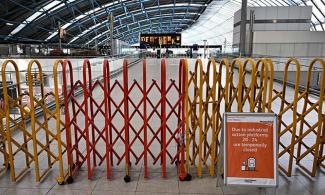
The strike action left many commuters stranded and persuaded many to stay at home.
Travel across British railway stations ground to a halt Tuesday as the country was hit by its biggest strike action in more than 30 years.
The strike action left many commuters stranded and persuaded many to stay at home.

According to the RMT rail union, the strikes are necessary as wages have failed to keep up with the inflation rate in the UK.
The inflation rate in the UK hit a 40-year high and is on course to keep rising, news.com.au reports.
But negotiations will resume Wednesday, the RMT announced. Network Rail, which looks after the country's rail tracks, told AFP discussions would begin at 10:00 am (0900 GMT).
Passengers were warned not to travel all week, with two more days of strike action scheduled for Thursday and Saturday playing havoc with schedules.
Long queues formed at bus stops on the outskirts of London shortly after 6:00 am (0500 GMT), but many gave up as services carried on without stopping, already full.
"Everything is kind of going tits up at the moment – planes, trains, everything.
The country appeared divided over the strikes, with 37 percent in favour this week compared with 45 percent against, according to a snap YouGov survey.
Transport Secretary Grant Shapps said he "deplored" the strikes, which he said evoked the "bad old days of the 1970s" when industrial action was far more common.
The country needed to "stay the course", defending reforms to the rail network as needed and in the public interest.
The walkouts risk causing significant disruption to major events including the Glastonbury music festival.
The strikes are the biggest dispute on Britain's railway network since 1989, according to the RMT. And rail operators warn of disruption throughout the week.
And as well as the above-ground rail strike, RMT members on the London Underground are staging a 24-hour Tube train stoppage Tuesday.
Unions also warn railway jobs are at risk, with passenger traffic yet to fully recover after the lifting of coronavirus pandemic lockdowns.